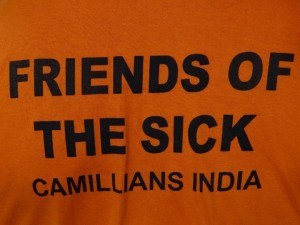 Fr. Sebastian (Santhosh) Christi, an Indian Camillian has joined in a two-week evangelization mission and visit to the internally displaced people (IDPs) of Kurdistan, Iraq together with the other two delegates from Christeen and Fiath Ministries. This is in response to the invitation of Archbishop Bashar Matte, the Archbishop of Erbil. Fr. Santhosh is presently assigned as superior of Snehatheeram, a home for persons living with terminal infirmities and loneliness (PLTIL) primarily Persons Living with HIV (PLHIV). He is also at the same time in charge of one of the regional centers of the Camillian Task Force, India.
Fr. Sebastian (Santhosh) Christi, an Indian Camillian has joined in a two-week evangelization mission and visit to the internally displaced people (IDPs) of Kurdistan, Iraq together with the other two delegates from Christeen and Fiath Ministries. This is in response to the invitation of Archbishop Bashar Matte, the Archbishop of Erbil. Fr. Santhosh is presently assigned as superior of Snehatheeram, a home for persons living with terminal infirmities and loneliness (PLTIL) primarily Persons Living with HIV (PLHIV). He is also at the same time in charge of one of the regional centers of the Camillian Task Force, India.
**************
I am trying to draw detailed (but not exhaustive) picture of the situation and the needs of – and the Camillians possibilities for – the Internally Displace People (IDPs) in Kurdistan (Iraq). Through the short email-sharing on my visit to Erbil (Kurdistan, Iraq) was on the IDPs under the care of the Chaldean Catholic Archdiocese of Erbil. There are also IDP camps outside the circle of the church, say, directly under the Government. We did not attempt to visit any of them owing to other possible complications/formalities this may require. For us it was better and easier to approach the Archbishop to enter into the field, and the same channel will be safer and easier in the future too.
What does the diocese do in particular for this people?
In fact, the church does a lot. But the need is beyond the local church can handle with the limited human resources.
Residential Facility:
The Chaldean Catholic Archdiocese of Erbil has rented some houses from the locals and given out for the IDPs (a house for 4 families – average)
Archdiocese has accommodated many families in the church institutions and open grounds where the caravans are arranged for the IDPs.
One of the parishes (Mar Elia Parish) has accommodated more than 40 families in the compound, now full of caravans, which was a beautiful garden previously.
Clinic: The Chaldean Catholic Archdiocese of Erbil has a clinic with three Nuns and may Volunteers to help those who are sick in the IDP camps. But the IDPs need to go to the clinic. There are doctors every day (each day each Speciality – usually a doctor a day). Medicine is free of cost.
Walking Together in Hope: Some of the local nuns stay in some camps in separate caravans (container houses) and walk with the in their time of distress. But they are very few in number.
Faith and Morals: Some nuns visit the camps from their convents and teach the children catechism etc.
Hand-in-Hand: The Archbishop and the priests are involved in fund raising and coordinating the mission.
Upcoming: The Archdiocese has dropped some of its projects and is now on move with more urgent projects
Maternity hospital: shortly beginning a maternity hospital, converting the huge unfinished hospital building for the purpose.
University: there is also a live plan to begin a university so that the children of the IDPs can continue/resume their studies.
Is it possible to support local church?
The local church is in need of the every type of support. But the means and methods are to be discussed and planned.
Is it possible to buy food from these places?
Food (food materials), as far as I have learned, is provided by an organization – Church in Need. They have issued a card through the Chaldean Catholic Archdiocese of Erbil, with which the IDPs collect food materials monthly (free). They are given also another card by UN to let them purchase monthly other items from a few selected shops for a fixed amount. Other than these, they are supported with free medical help (clinic by the archdiocese)
Is enough medicine available in the local market?
With regard to this question, I am not very sure. They did not tell us there is any need of medicines but only they need money to buy medicines. And there is no epidemic demanding huge amount of medicines.
Do we need more volunteers?
 As of now there is nothing to be done as an emergency (disaster management proper as on the face of a disaster). However volunteers who can take long term commitment in helping them in various aspects will be helpful. The possibilities are so many but the church there may not be able to imagine all of them because the concerns are more than they can afford. They are hardly 15 priest in the archdiocese and each IDP camp may have 200-5000 members (40-1200 families). In some camps there are priests of their own parish who fled with them. But some others are attached to some parish churches. There may be camps away from direct care of the church too.
As of now there is nothing to be done as an emergency (disaster management proper as on the face of a disaster). However volunteers who can take long term commitment in helping them in various aspects will be helpful. The possibilities are so many but the church there may not be able to imagine all of them because the concerns are more than they can afford. They are hardly 15 priest in the archdiocese and each IDP camp may have 200-5000 members (40-1200 families). In some camps there are priests of their own parish who fled with them. But some others are attached to some parish churches. There may be camps away from direct care of the church too.
The archbishop also is concerned of the safety of the people who volunteer. He is reluctant to invite us just because he can’t guarantee safety.
What is the best possible way to implement psychosocial support?
It is a very needful area but a very challenging one for us who are foreign to their language. They speak only Arabic and Aramaic (some locals speak Kurdish language). Immediate Psychological support can be rendered if only we have people who can handle the language/s. Later stage psychological rehabilitation can be done through training the locals and animating them for the cause. Other social supports can be rendered with the help of the locals.
What do they think the most urgent needs and concerns?
All the points I share answering this question are result of my assessment of the situation. Some of these may not have even been thought by the church in Erbil, or at least might not have been shared by them in our discussions.
Monetary Help: Archbishop has not told us anything directly. However, as i sense, they are very much in need of money to handle the rent to be paid for the houses, medicines and the like. It may be a huge amount.
Psychological Rehabilitation: Moreover, the psychological trauma and hopelessness need to be addressed at the earliest. Many IDPs seem to be mentally broken.
Addressing Faith and Moral Issues: the families are unsettled, many living under one roof. Faith and morals are at question! This need to be addressed as a major concern.
Spiritual Accompaniment to Instil Hope: Many of the IDPs are lost in fear, trauma and despair resulting in weakening/loss of trust in the Lord. Though they are involved in religious practices, their hope for a better future and divine interventions are shallow. They have seen the power of the human selfishness and brutality enfleshed…. which overshadows their trust and hope! We need to walk with them with hope… take them to the unseen horizons of God’s care…. as Moses in the desert!
Who are their partners?
As far as I know, they are collaborating with:
United Nations
Church in Need. I am not sure there are more.













Camillians on Facebook
Camillians on Twitter
Camillians on Instagram